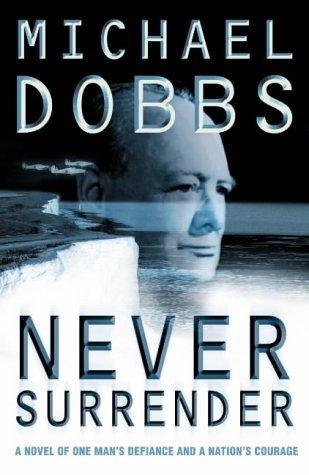Never Surrender, by Michael Dobbs
Nov 5
2007

While we here at Wordcandy usually prefer our books to be straight-up flufftastic fiction, we periodically feel the need to broaden our horizons. Sometimes this leads to misery and regret (see: our review of Ann Brashares’s The Last Summer (of You and Me)), but sometimes it totally pays off, and we end up reading a moving, well-crafted book like Michael Dobbs’s Never Surrender, a fictionalized account of Winston Churchill’s struggle to keep Britain alive during World War II.
Never Surrender focuses on one of the most critical periods in England’s history. Set during the first three weeks of Hitler’s push into France, Belgium, and Holland, Winston Churchill finds himself in an unenviable position. The British army is being pushed back to Dunkirk, and Churchill is fighting battles on all fronts: the Nazis, the British parliament, and ghosts from his past.
There were scenes in Never Surrender that I could have lived without reading. I didn’t need Dobbs’ graphic descriptions of death and suffering to accept that World War II was unimaginably awful. (I was already sold on that point.) Happily, Never Surrender is about more than tanks and bombs—it is also about perseverance, sacrifice, and courage.
Obviously, we can’t toss all of our fact-based history books in favor of fictionalized accounts (no matter how “unbiased” they try to be, author perception can’t help but influence the story), but compelling, carefully researched novels like Never Surrender transform unadorned facts into something that packs a hefty emotional wallop. I might take Dobbs’s depiction of Churchill’s personal demons—not to mention his inner monologue—with a grain of salt, but Never Surrender will linger in my mind much longer than the dry names and dates in my school history textbooks.
Never Surrender focuses on one of the most critical periods in England’s history. Set during the first three weeks of Hitler’s push into France, Belgium, and Holland, Winston Churchill finds himself in an unenviable position. The British army is being pushed back to Dunkirk, and Churchill is fighting battles on all fronts: the Nazis, the British parliament, and ghosts from his past.
There were scenes in Never Surrender that I could have lived without reading. I didn’t need Dobbs’ graphic descriptions of death and suffering to accept that World War II was unimaginably awful. (I was already sold on that point.) Happily, Never Surrender is about more than tanks and bombs—it is also about perseverance, sacrifice, and courage.
Obviously, we can’t toss all of our fact-based history books in favor of fictionalized accounts (no matter how “unbiased” they try to be, author perception can’t help but influence the story), but compelling, carefully researched novels like Never Surrender transform unadorned facts into something that packs a hefty emotional wallop. I might take Dobbs’s depiction of Churchill’s personal demons—not to mention his inner monologue—with a grain of salt, but Never Surrender will linger in my mind much longer than the dry names and dates in my school history textbooks.
Posted by: Julia, Last edit by: Julianka
No new comments are allowed on this post.
Comments
No comments yet. Be the first!